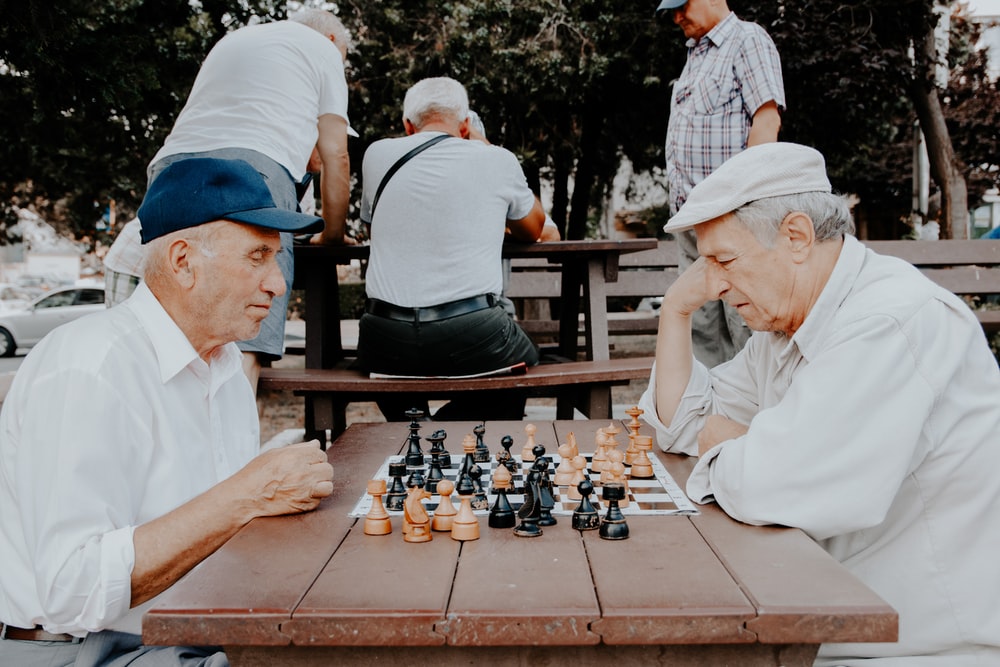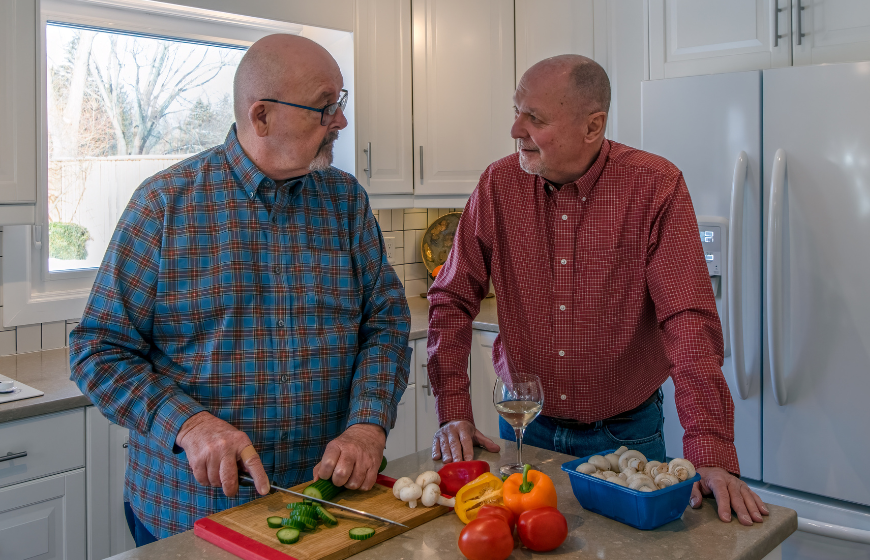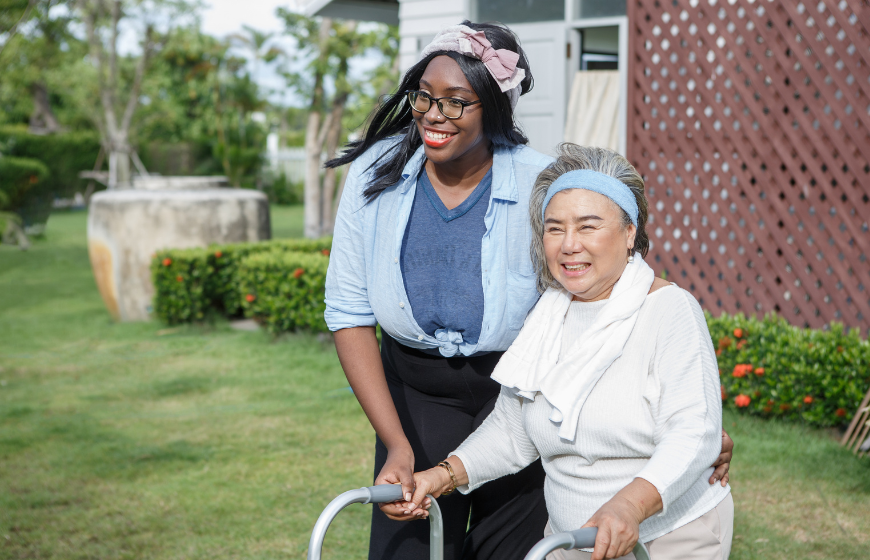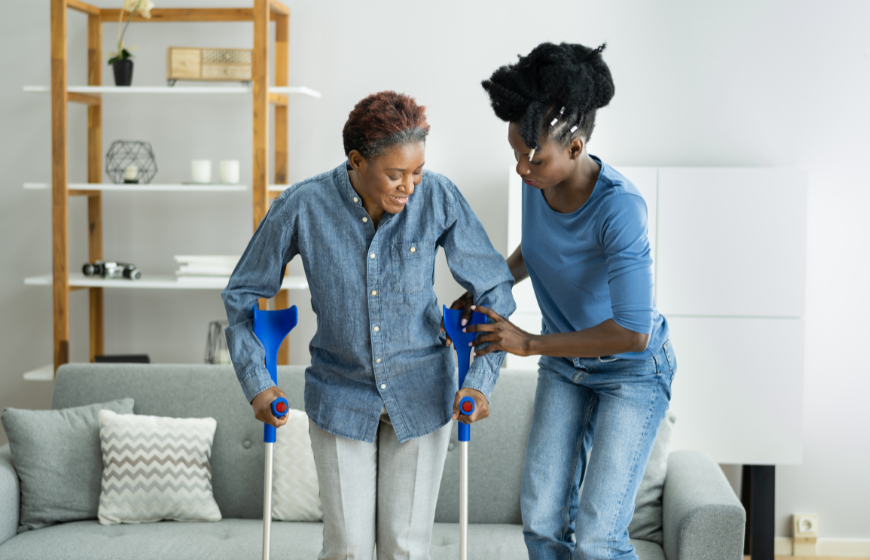Aging is one of the most uncomfortable truths of living: as we get older, our health can decline, leaving us more susceptible to disease and health issues such as stroke.
This reality can be particularly tough to swallow as we witness the effects of aging on our elderly loved ones. But, the old adage “knowledge is power” rings true here. The more that you know about the health risks associated with aging, the more you can help your loved ones navigate their well-being over the long haul.
In this article, we will discuss the close correlation between age and stroke risk, other causes of strokes, and tips for preventing this type of disease. We’ll also prepare you with information about recovery and stroke treatment if the worst were to happen. You may also want to consider reading our post about identifying mini stroke symptoms in the elderly. With this stroke patient knowledge, you’ll be better equipped to help care for your aging loved ones.
What Is a Stroke?
Strokes are a neurologic disturbance caused by a lack of proper blood flow to the brain. Because the brain requires blood and oxygen to survive, strokes can cause harm to brain cells and result in permanent disability or even death.
There are two primary categories of strokes:1
- Ischemic stroke
- Hemorrhagic stroke
There is also a subtype of ischemic strokes commonly called mini strokes. Transient ischemic attacks (TIA) are temporary obstructions of blood flow to the brain that cause the same stroke symptoms as any other stroke but with a shorter duration. Although the term ‘mini stroke’ seems to imply that these incidents are less serious, they are considered warning strokes by medical professionals. These strokes often indicate that a severe stroke is coming soon and should be treated as a medical emergency like any other stroke.2
What causes mini strokes in aging adults is often closely related to the risk factors at the core of other types of strokes. Read on to learn more.
Causes of Stroke
As a complex neurological event that involves both the nervous system and cardiovascular system, strokes can be caused by a variety of factors.
When considering the causes of stroke in elderly people, some factors may be avoided while others are a bit tougher to circumvent.
Manageable Causes
With the help of a healthcare professional, these manageable causes of stroke can be addressed or treated in order to reduce the likelihood that your loved one will suffer from an acute stroke.
Smoking
Smoking cigarettes is detrimental to overall health—no new news here.
Back in 1964, then Surgeon General Luther L. Terry, M.D. released a report connecting smoking to a variety of health issues and diseases, including:3
- Lung cancer
- Laryngeal cancer
- Chronic bronchitis
This report launched a continued public health initiative to educate the public about the harm of tobacco use and smoking cigarettes that is still ongoing.
Although it is not one of the most commonly cited health risks associated with smoking, strokes can certainly be linked to it. In particular, cigarette smoke damages the cardiovascular system by way of nicotine and carbon monoxide, which can seriously increase the risk of stroke.
Thankfully, while smoking can cause irreversible damage, health risks associated with it can decrease dramatically with cessation. This makes smoking one of the most manageable causes of stroke. Remind your elderly loved one to:
- Take steps to stop smoking if they are currently a smoker
- Abstain from smoking if they have never been a smoker or have successfully quit in the past
Diabetes
Both Type 1 and Type 2 diabetes are conditions that affect the body’s ability to control blood sugar levels. Although this kind of disease may seem unrelated to strokes, people with diabetes are two times more likely to experience a stroke than those without.4
Blood sugar, or blood glucose, is an important part of how our body turns the food we eat into energy. The hormone insulin is necessary to allow glucose in the bloodstream to enter cells throughout the body, but diabetes affects the ability of the pancreas to produce insulin at all or in the right amounts. This means that for people with diabetes, glucose simply remains in the bloodstream rather than properly entering cells throughout the body. Too much blood glucose can lead to an increased risk of deposits or blood clots, which can result in an ischemic stroke.
For those with diabetes, properly managing the disease with the assistance of a doctor can reduce the likelihood of blockages and strokes.
High Blood Pressure
Another manageable cause of stroke is high blood pressure, also called hypertension. Over time, high blood pressure can cause damage to arteries throughout the body. This damage can both make it more likely that weakened arteries in the brain will clog or burst, resulting in either an ischemic or hemorrhagic stroke.5
Thus, having high blood pressure and not taking the steps necessary to lower it through medication, diet, and exercise is a significant cause of stroke in the elderly.
Uncontrollable Causes
Although there are causes of stroke that can be managed as preventative measures to reduce the risk of stroke, there are factors that may be outside of any aging adult’s control.
Age
Unfortunately for older adults, age is a risk factor for stroke that is out of their hands.
While strokes are possible at any age, including infancy and childhood, the risk of stroke drastically increases with advanced age. Over 70% of all strokes occur in people above the age of 65.
Nothing can be done to reduce the heightened risk of stroke associated with age alone, though managing the other controllable risk factors mentioned above can improve overall health and generally reduce the risk of stroke.6
Genetics
As with many diseases and health risks, a stroke patient’s likelihood for stroke can depend heavily on genetics and family history.
- Individuals can be genetically predisposed for high blood pressure and diabetes, two significant causes of strokes in the elderly. This means that even with proper preventative care, some people will be more likely to develop these risk factors simply due to the prevalence of these diseases in their families.
- A family history of strokes themselves can also make these events more likely to occur. For those with close family members who have experienced a stroke, the risk factor of stroke is increased. If that family member had a stroke before the age of 65 (indicating that their stroke may have been due to other factors such as vascular genetic disorders rather than age alone) the stroke risk is additionally increased.
Other genetic factors can also affect the risk of stroke, including race and gender and the predispositions to certain diseases included for each.
How to Help In the Event of a Stroke
If an acute stroke does occur, one way those who may witness the event can respond is by remembering to “act FAST.”
This means identifying the most common stroke symptoms of any stroke (regardless of type) using the FAST acronym, and then getting that person medical attention immediately if a stroke is suspected:
- F (face drooping)
- A (arm weakness)
- S (speech difficulty)
- T (time to call 911)
Identifying a stroke and seeking immediate emergency medical treatment is incredibly important, as every second counts during a stroke: the longer someone waits to get treatment, the more severe the stroke survivor effects are likely to be.
What to Expect After a Stroke
For families and loved ones who may experience a stroke, the consequences can be devastating. As a stroke victim, maintaining a sense of hope and following up with proper treatment and recovery, however, can make all the difference when it comes to avoiding long-term negative effects and help improve life expectancy after a stroke at 70.
Treatment and Recovery
The first step when it comes to stroke treatment? Getting stroke patients to the hospital as quickly as possible. Medicine can be given to repair the blood clot or blockage obstructing blood flow. Other procedures can also be done to mend the vessel in the case of hemorrhagic strokes.
When recovering from a stroke, long-term rehabilitation may be required for any ongoing symptoms or disabilities. This can include physical or occupational therapy and balance exercises for seniors so that they can regain strength in affected muscle groups and speech therapy to improve communication skills and swallowing abilities.
Alliance HomeCare: For Your Long-Term Stroke Care Needs
Strokes can be a scary and, sometimes, inevitable part of life. But educating yourself about the common causes is a productive first step when it comes to keeping your loved ones healthy and out of harm’s way.
The next step? Securing the proper care with Alliance Homecare.
At Alliance Homecare, we provide quality and compassionate long-term care right in the comfort of your loved one’s home. Our home medical assistance helps you stay on top of it all by monitoring the symptoms of stroke and providing specialists that can help in the process of recovery and provide you with all the benefits of home care.
We offer customized care plans, full-service concierge home care delivery, high quality, credentialed caregivers, and, most importantly, peace of mind.
Start putting your health in good hands today.
Sources:
- American Stroke Association. Types of Stroke. https://www.stroke.org/en/about-stroke/types-of-stroke
- American Stroke Association. TAI (Transient Ischemic Attack). https://www.stroke.org/en/about-stroke/types-of-stroke/tia-transient-ischemic-attack
- Centers for Disease Control and Prevention. History of the Surgeon General’s Reports on Smoking and Health. https://www.cdc.gov/tobacco/data_statistics/sgr/history/index.htm
- Centers for Disease Control and Prevention. Diabetes and Your Heart. https://www.cdc.gov/diabetes/library/features/diabetes-and-heart.html#:~:text=If%20you%20have%20diabetes%2C%20you,and%20at%20a%20younger%20age.
- American Heart Association. How High Blood Pressure Can Lead to Stroke. https://www.heart.org/en/health-topics/high-blood-pressure/health-threats-from-high-blood-pressure/how-high-blood-pressure-can-lead-to-stroke
- The National Center for Biotechnology Information. Influence of Age and Health Behaviors on Stroke Risk: Lessons from Longitudinal Studies. https://www.ncbi.nlm.nih.gov/pmc/articles/PMC3006180/
- American Stroke Association. Stroke Symptoms. https://www.stroke.org/en/about-stroke/stroke-symptoms





